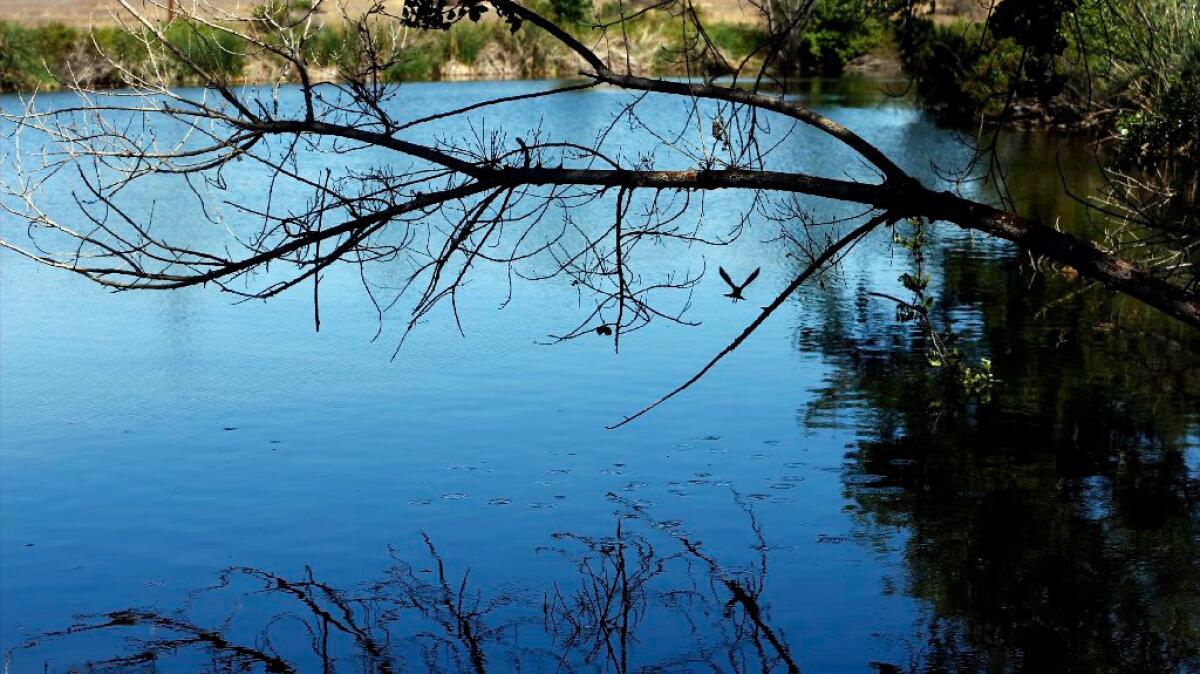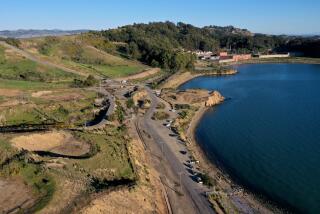Proposed ‘green’ music festival stirs environmental skirmish

A proposal to stage “the world’s greenest music festival” in the San Fernando Valley’s Sepulveda Dam Basin has left local environmentalists at odds, pitting activist against activist in a dispute over the future stability of the urban oasis.
Environmentalists are arguing over the potential impacts of the three-day event, dubbed AngelFest, on groves and undergrowth that are home to a rich inventory of animals: coyotes, opossums, raccoons, shrews, king snakes, salamanders and 250 species of birds.
They are also divided over a main mission of the festival: to donate a portion of ticket sales to the cash-strapped Los Angeles Department of Recreation and Parks, which leases the basin from the U.S. Army Corps of Engineers and manages its recreational activities.
The wildlife habitat is not as nice as it once was. There’s trash in the streams, sex and drug trafficking in the shrubs and no rangers in sight.
— Tim Sexton, Make Good Group
City officials have asked the Corps to grant a waiver allowing the event to proceed in late 2017 in the area currently governed by regulations that limit events to 5,000 people, prohibit use of pyrotechnics and restrict amplified sound to the equivalent of a loud auto horn at 10 feet.
If approved, promoters predict the event will attract 250,000 people and generate roughly $1 million for the department. They also promise to highlight environmental nonprofits that support their effort in marketing campaigns and displays during the event.
As the Corps prepares to rule on the waiver request, environmentalists are choosing sides.
Groups including TreePeople, Liberty Hill Foundation, Mujeres de la Tierra, L.A. Water Keeper and the Los Angeles Conservation Corps support the event promoted by the Make Good Group and financially backed by Goldenvoice, which produces Coachella, the best-attended and highest-grossing music festival in the world.
Opposed to the festival are groups including the California Native Plant Society, the Urban Wildlands Group, the Endangered Habitats League and six Audubon chapters led by the San Fernando Valley Audubon Society.
“We’re being characterized by opponents as irresponsible, not mindful, and that somehow our actual intentions are not good,” said producer Tim Sexton, principal of the Make Good Group, which promotes itself as “a collaborative brand strategy and creative team that helps organizations reposition and redefine themselves.”
The company’s website notes that it has worked with such diverse enterprises as American Idol, the Philadelphia Eagles and PG&E to do everything from cause-related marketing to crisis management.
Sexton said his company’s goal with AngelFest is “to help make a positive difference in that area with three days of music.”
“Right now, it’s loaded with problems that can’t be solved by the city parks department without money,” he said. “The wildlife habitat is not as nice as it once was. There’s trash in the streams, sex and drug trafficking in the shrubs and no rangers in sight.”
“Yet,” he said, “the folks in opposition want to see us gone.”
Jim Houghton, a member of the board of directors of the San Fernando Valley Audubon Society, views the matter from a different perspective.
“The idea that a rock concert in the Sepulveda Basin is going to save Los Angeles — not exactly a backwater town — and elevate its stature in the world with biodegradable hot dog wrappers and diesel-fueled generators is baloney,” he said.
Music has always been at the center of every social justice movement.
— Cindy Montanez, CEO of TreePeople
“The promoters and groups that support them do not have a stake in the Sepulveda Basin like we do,” he said. “It’s not the right place for a festival of this scale. If they want to put on a show, great, do it — but do it someplace else.”
Not everyone believes the threat is all that pressing. Cindy Montanez, chief executive officer of TreePeople, which has worked with the San Fernando Valley Audubon chapter on Sepulveda Basin restoration projects in the past, thinks the festival could “help a park that needs a lot of attention.”
“Music has always been at the center of every social justice movement,” she said. “At AngelFest, if, say, the Rolling Stones say, ‘Let’s plant more trees!’ the message will go farther than anything we could ever do.”
The idea that a rock concert in the Sepulveda Basin is going to save Los Angeles...with biodegradable hot dog wrappers and diesel-fueled generators is baloney.
— Jim Houghton, San Fernando Valley Audubon Society
An environmental assessment conducted on behalf of the Department of Recreation and Parks found the festival would cause no significant damage to the environment or surrounding community.
The promoters say the event will operate under aggressive recycling guidelines including that food and beverages be served in compostable packaging and that festival generators be powered by biofuels. Plastic bottles and bags will be banned from the festival grounds.
But ongoing petition drives demonstrate polarization.
So far, a petition in support of Angelfest has collected almost 10,000 signatures.
A petition opposed to Angelfest has gathered roughly 6,000.
In a letter to the Army Corps, Kris Olencamp, a spokesman for San Fernando Valley Audubon, said “this turmoil could have been prevented” if city parks officials had consulted with local Audubon members and the Sepulveda Basin Wildlife Areas Steering Committee in the early phases of the process.
That rankles Irma Munoz, president of Mujeres de la Tierra, which supports the event.
“I find it offensive that some groups feel they own that space and have the right to determine who can use it,” Munoz said. “They don’t have that right. It’s public land supported by public tax dollars.”
Jonathan Parfrey, chief executive of Climate Resolve — a nonprofit “dedicated to creating real, practical solutions to meet the climate challenge while building a better city for Angelenos” — urges a see-what-happens approach.
“I say let’s try it out for the first year — if there are problems with the natural environment we’ll have learned a lesson,” he said. “But if it works, I’m in favor of it.”
Follow me @LouisSahagun
ALSO
50 to 60 homes burn in fast-moving brush fire in Kern County
Ventura County oil spill misses the ocean, but damage on land is unclear
Crow causes outage, leaving 15,000 homes and businesses in San Fernando Valley without power
More to Read
Sign up for Essential California
The most important California stories and recommendations in your inbox every morning.
You may occasionally receive promotional content from the Los Angeles Times.











